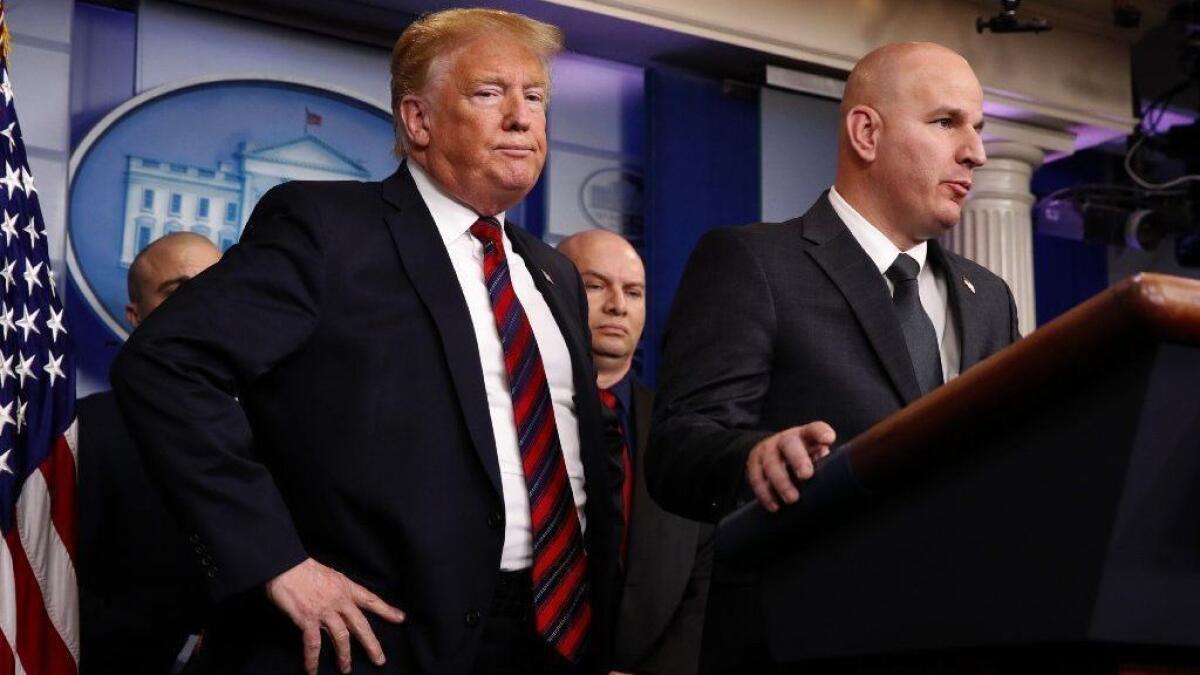Readers React: Former Reagan administration attorney: Trump declaring a national emergency would set a dangerous precedent

- Share via
To the editor: UC Berkeley law professor John Yoo argues that if President Trump were to declare a state of emergency in order to build his wall, his actions would likely withstand court challenges.
Yoo has experience in government guiding presidents, having served President George W. Bush as deputy assistant attorney general in the office of legal counsel. I served President Ronald Reagan more than a decade earlier in that same capacity. But we view the question of whether Trump can legally divert funds by declaring an emergency very differently.
While working in the Reagan administration, I was asked to produce a memorandum justifying a presidential diversion of congressionally allocated funds, a proposed action in many ways similar to the one that Trump now seeks for building a border wall with Mexico. I concluded that the president had no authority to reallocate the funds.
Presidential efforts to bypass congressional negotiations in the name of national emergency are not condoned by the Constitution. And the 1976 National Emergency Act and the 1977 International Emergency Economic Powers Act both curb unfettered presidential power.
The thin cloth of “national emergency” embraced by Yoo would set a dangerous precedent.
Allan Gerson, Washington
..
To the editor: Another California law professor, former five-term congressman Tom Campbell of Chapman University, recently wrote an op-ed article that was published in several local newspapers entitled, “The complex way in which Trump gets his border wall.” He seems to basically concur with Yoo.
Campbell goes beyond Yoo’s citing of Thomas Jefferson, Andrew Jackson, Abraham Lincoln and Franklin D. Roosevelt, concluding: “Obama got his prisoner trade, Clinton got his war in Yugoslavia. Trump will get his wall, and the government shutdown will end.”
The final question remains: What is holding up Trump from calling a national emergency that would likely be held up by the courts?
Harvey Pearson, Los Feliz
..
To the editor: I’m not an attorney, but I am a historian of the U.S. with a doctorate from Stanford, and my knowledge of that history leads me to disagree with Yoo. Before setting forth the substance of my argument, I note that Yoo was the attorney whose briefs laid the groundwork for the use of waterboarding during the George W. Bush administration, so we know he takes an expansive view of presidential authority.
How does history enter into the discussion? First, there is the matter of the centuries-long evolution of the legislature’s sole power to levy taxes, or the power of the purse.
Before American independence, the British parliament fought with various kings to establish this principle, one that is embedded in the U.S. Constitution in Article I. Over the years, this power has been absolutely fundamental in limiting the capacity of the president to behave in arbitrary ways.
Second, on those occasions when a president has gone beyond the Constitution, such as Lincoln’s suspension of habeas corpus during the Civil War, it has been during a widely recognized and genuine national emergency, as in the existential threat to the survival of the union during that war.
The president cannot arbitrarily declare an emergency that is recognized by few others and get away with ignoring Congress.
Glenna Matthews, Laguna Beach
Follow the Opinion section on Twitter @latimesopinion and Facebook
More to Read
A cure for the common opinion
Get thought-provoking perspectives with our weekly newsletter.
You may occasionally receive promotional content from the Los Angeles Times.









